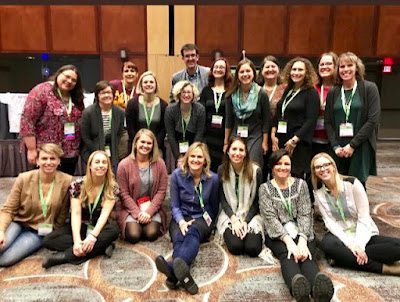The Power of a Just-Right Book
 When we connect with a book we love, we are changed. We learn a lot - in my case, I learned about France during World War II - we get to know people and experiences in new ways. We have conversations - on Facebook, with others who had read The Nightingale, and in my classroom as I shared snippets with my students.
When we connect with a book we love, we are changed. We learn a lot - in my case, I learned about France during World War II - we get to know people and experiences in new ways. We have conversations - on Facebook, with others who had read The Nightingale, and in my classroom as I shared snippets with my students. But here's the deal: I chose to read that book. No one made me. I had read the reviews on Amazon - lots of stars always piques my interest. I had heard people talking about it. So I bought it. And then it sat there. It was supposed to be read, but I wasn't in the mood. I read Me, Earl and the Dying Girl instead.
Then I had a conversation with my friend Carolyn, who never fails to recommend books I'll love. The clincher for me was this, "It got me over Fates and Furies," she said. Sold. We had both loved that book and struggled to find a good read after finishing it. So I dove in. Straight into the dream-inducing world of The Nightingale.
What would happen in our classrooms if students got to have experiences with books at school like I had reading The Nightingale? Can you imagine? Here are three things that might happen if students were allowed to read books they choose, the books they are ready for, and the books they are in the mood for:
1. Deep engagement. I mean deep. When students find books that really fit them, they want to read. Their minds are living the story, being transported to a new place in time. Theo got in trouble in another class for reading Carl Dueker's Runner. "But I had to finish it," he said. "I've never read a book like that before."
I'm probably not alone in hearing complaints about kids not being engaged. Their phones are out; they're zoning out; they keep talking to other people; they just don't seem to care. That is true. But how often do we teach engagement? How often do we explicitly talk about what it feels like to get so lost in a book (or any other project we're passionate about) that everything else in the world falls away? To experience this feeling, a person has to be doing something he or she is passionate about, and a person needs time.
Sometimes I think about the school day from a student's perspective: they are asked to switch gears a lot, from subject to subject, and even within classes, from one activity to the next. Even when they do find something they want to keep doing, they are expected to stop. When teachers allow choice and time with books, students begin to see reading as a pleasurable activity that they want to choose to do other places. Theo's experience with Runner is just one of many I've seen with my so-called resistant readers. People say they won't read outside of school, but I say, with the right book, anything can happen.
3. Truly differentiated, timely education. When a student finds a book that is just what they need in the moment, he or she will always grow in the perfect way. We as teachers do our best to confer with students, plan lessons and help them grow in ways that we think they need to grow. But how many times do kids get to choose how and when they grow? How many times do we miss the mark, thinking we knew what academic lesson was needed, when really, the student needed a heart lesson more. Just right books have the power to meet kids in the way they need right when they need it.
When Mandy picked up Nicola Yoon's Everything Everything, she was fascinated by the mother/daughter relationship. She'd arrive in class, ready to tell me what happened and her latest theory about what was going on. This was a huge change from the girl who could hardly put down her phone. Something in this book clicked, and she was ready for more. Did I need to know exactly what? Nope.
I can't imagine a life without the freedom to read books that I love. I can't imagine navigating a particularly difficult time without a story to escape into, or a character to give me courage because their situation is so much worse than my own. And yet, everyday so many adolescents struggle with issues they tell no one about. Like Eleanor in Rainbow Rowell's Eleanor and Park, they just try to get through each day, hoping no one will be too cruel. What if a book offers hope, gives courage, or helps them gain strength? That is the power of a just-right book, and a teacher who lets her kids read.
"If you only read the books that everyone else is reading, you can only think what everyone else is thinking."
-Haruki Murakami





Comments
Post a Comment